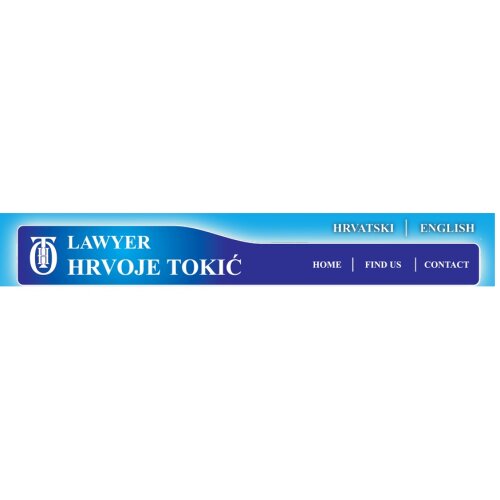Best Nonprofit & Charitable Organizations Lawyers in Dubrovnik
Share your needs with us, get contacted by law firms.
Free. Takes 2 min.
List of the best lawyers in Dubrovnik, Croatia
About Nonprofit & Charitable Organizations Law in Dubrovnik, Croatia
Nonprofit and charitable organizations in Dubrovnik, Croatia play a vital role in addressing social, cultural, educational, and environmental needs. Governed by a framework of laws designed to promote transparency, accountability, and social benefit, these organizations can range from small local initiatives to larger international operations. The primary legal structures applicable to nonprofits in Croatia include associations, foundations, and charitable trusts. Understanding the legal requirements for establishment, governance, and operation is crucial for ensuring compliance and maximizing impact.
Why You May Need a Lawyer
Legal expertise is often required in the nonprofit sector to navigate the complexities of Croatian laws and regulations. Common situations that may necessitate legal assistance include establishing a nonprofit organization, understanding tax obligations, handling employment law issues, drafting contracts, and ensuring compliance with regulatory requirements. Additionally, legal advice can be useful for resolving disputes, managing intellectual property, and structuring partnerships or mergers with other entities.
Local Laws Overview
The legal framework for nonprofits in Dubrovnik, Croatia is influenced by national legislation, including the Law on Associations and the Law on Foundations. Key aspects include the process of registration, governance requirements, financial reporting, and compliance with taxation rules. Nonprofits must register with the relevant government bodies, establish a governing board, maintain transparent financial practices, and adhere to the public benefit requirements set by law. Specific attention must be paid to any changes in legislation that could affect operational activities.
Frequently Asked Questions
What is the process for registering a nonprofit in Dubrovnik?
To register a nonprofit in Dubrovnik, one must submit the necessary documentation to the Registry of Associations, including the statute of the organization, personal identification of founding members, and proof of a registered office. Once approved, the nonprofit is officially recognized under Croatian law.
Are there any tax benefits for nonprofits in Croatia?
Yes, nonprofits in Croatia may be eligible for tax exemptions, specifically the exemption from income tax on funds that support their registered mission. It is crucial to maintain accurate financial records to qualify for these benefits.
Can a foreigner establish a nonprofit in Croatia?
Yes, foreigners can establish nonprofits in Croatia. However, the process may involve additional requirements, such as validating foreign documents or fulfilling residency stipulations.
How can nonprofits ensure compliance with local regulations?
Nonprofits should stay informed about changes in legislation, maintain good governance practices, ensure financial transparency, and seek regular legal counsel to ensure ongoing compliance.
What are the reporting requirements for a nonprofit?
Nonprofits must prepare and submit annual financial statements and activity reports to the relevant authorities. These documents should reflect accurate financial positions and operational outcomes.
What role does a governing board play in a nonprofit?
The governing board provides oversight, strategic direction, and accountability for the nonprofit’s activities. Members of the board are responsible for ensuring compliance with legal obligations and the organization's adherence to its mission.
Can nonprofits engage in commercial activities?
Yes, nonprofits in Croatia can engage in commercial activities, but profits from those activities must be reinvested in supporting the organization's primary purpose and mission.
What are the consequences of non-compliance with nonprofit laws?
Non-compliance can result in fines, revocation of tax-exempt status, or even dissolution of the organization. Regular legal reviews can help mitigate these risks.
Is it possible to merge or collaborate with other nonprofits?
Yes, nonprofits can merge or collaborate with other entities. Careful legal structuring and agreement drafting are necessary to ensure that such partnerships align with legal requirements and organizational goals.
How can employment law affect a nonprofit?
Nonprofits in Croatia are subject to the same labor laws as other businesses. This includes laws regarding working conditions, employee rights, and contractual obligations. Legal guidance may help in drafting clear employment contracts and policies.
Additional Resources
For further information, consider reaching out to the Croatian Government's Office for Cooperation with NGOs and local legal firms specializing in nonprofit law. Additionally, organizations like the Croatian Law Centre offer insights into legal matters pertinent to nonprofits.
Next Steps
If you need legal assistance for a nonprofit organization in Dubrovnik, Croatia, start by identifying the specific legal issues you are facing. Contact a legal professional specializing in nonprofit law to discuss your needs. Prepare any relevant documentation and information to facilitate a productive consultation. Ensuring early and thorough legal guidance can help your organization operate efficiently and legally within Croatia's framework.
Lawzana helps you find the best lawyers and law firms in Dubrovnik through a curated and pre-screened list of qualified legal professionals. Our platform offers rankings and detailed profiles of attorneys and law firms, allowing you to compare based on practice areas, including Nonprofit & Charitable Organizations, experience, and client feedback.
Each profile includes a description of the firm's areas of practice, client reviews, team members and partners, year of establishment, spoken languages, office locations, contact information, social media presence, and any published articles or resources. Most firms on our platform speak English and are experienced in both local and international legal matters.
Get a quote from top-rated law firms in Dubrovnik, Croatia — quickly, securely, and without unnecessary hassle.
Disclaimer:
The information provided on this page is for general informational purposes only and does not constitute legal advice. While we strive to ensure the accuracy and relevance of the content, legal information may change over time, and interpretations of the law can vary. You should always consult with a qualified legal professional for advice specific to your situation.
We disclaim all liability for actions taken or not taken based on the content of this page. If you believe any information is incorrect or outdated, please contact us, and we will review and update it where appropriate.








